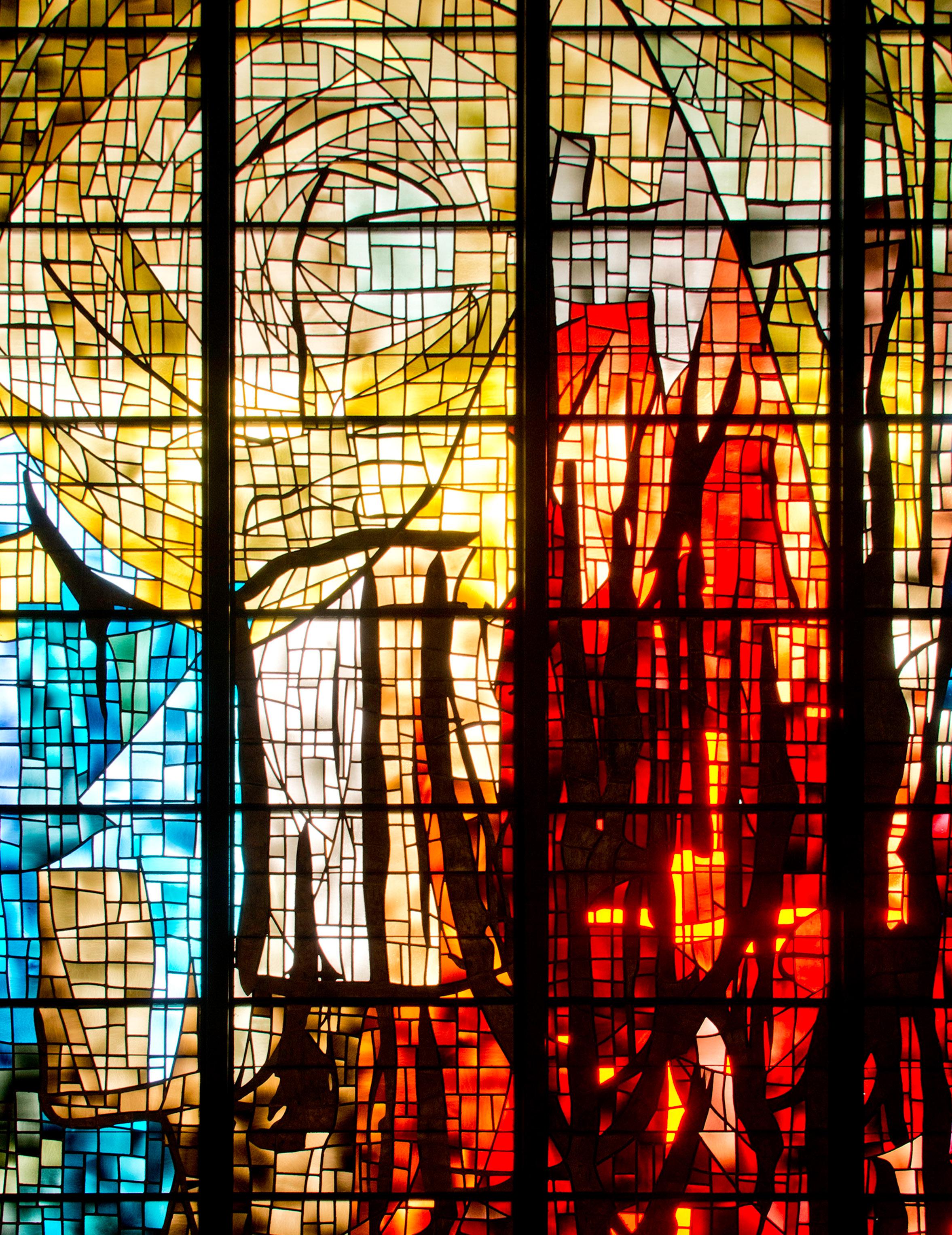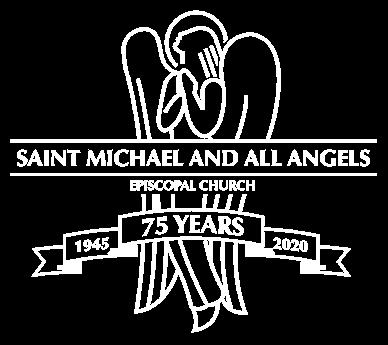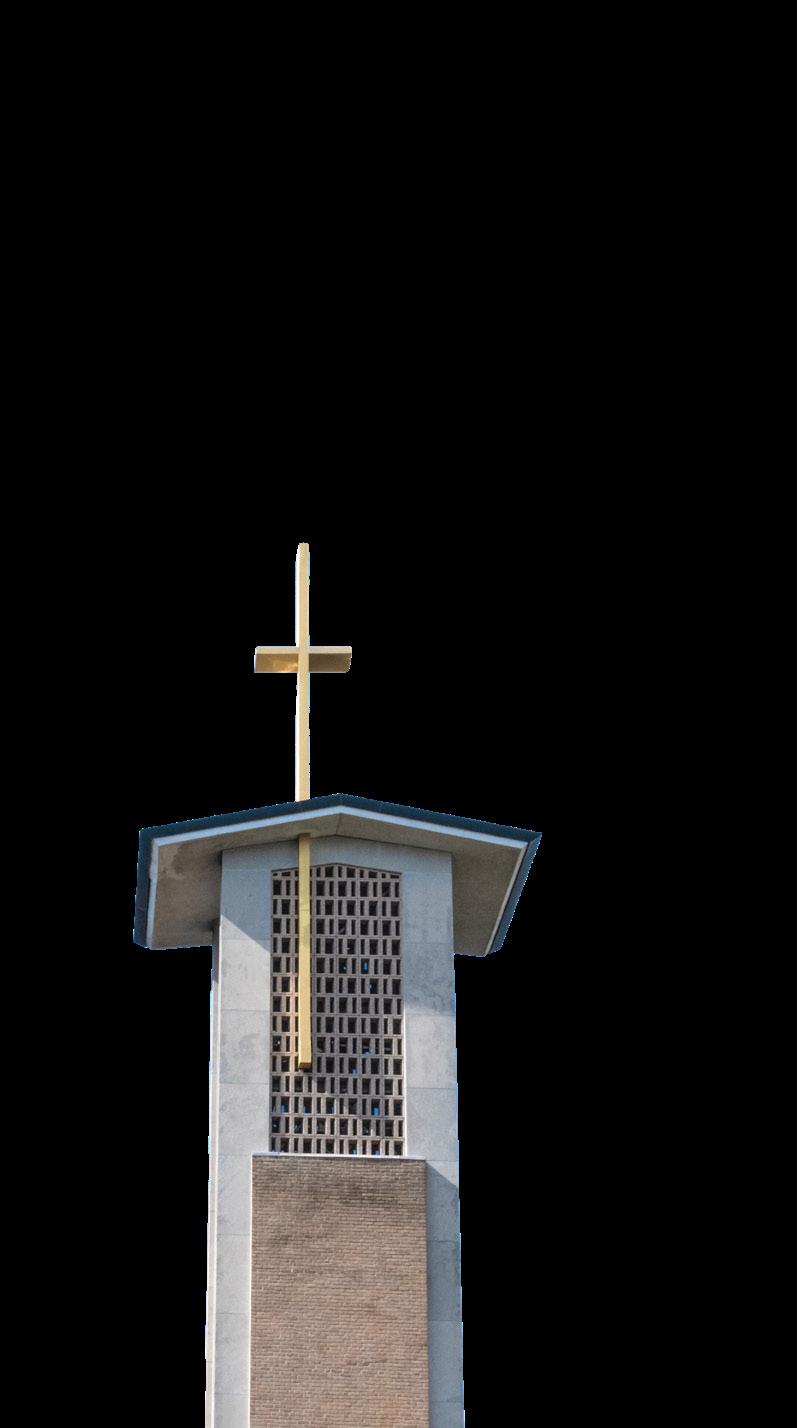Advent

LESSONS AND CAROLS
Throughout the centuries, the season of Advent has seen various aspects of the coming of God realized in liturgy. Today, we return to a pre-Covid way of offering this service with numerous processions and placements of the choir in the church space. In so many ways, the journey of the choir throughout this service represents us all–and even all of human kind. Advent Lessons and Carols is punctuated by a succession of readings from prophets. In between these readings, we hear music sung by the choir and/or the congregation which further elaborate on the story of God’s coming. As the service unfolds, anticipation of God’s coming builds.
At the beginning of the service, the choir is intentionally at their most distant. The voice of a prophet states this in the very first words, “I look from afar.” As the service continues, you will see the choir process a number of times and each time arrive closer to the altar. This movement symbolizes generations of humanity searching for God and coming closer with each prophet. Ultimately, the choir will arrive at the altar in their choir desks following the Annunciation reading–but not before the Annunciation reading. Thus, when we hear that the coming of Christ will happen not in the future but now, we move to the altar–which symbolizes Christ and where Christ comes to us in the Holy Eucharist.
This kind of liturgical dramatization of God coming closer and closer has been a hallmark of Advent Lessons and Carols (sometimes called the Advent Procession) in many churches for generations. We hope the beauty, richness, and symbolism of this service is a meaningful part of your preparation for Christmas. Be sure to join us for Christmas Lessons and Carols, when our combined adult choir and choristers will lead the service entirely from the altar, on Sunday, December 18 at 4 p.m., and our new Epiphany Lessons and Carols service, which completes the cycle and will be a combined traditional and contemporary, on Sunday, January 22 at 4 p.m.!
Jonathan Ryan Director of Music and Organist

Prelude
Desseins éternels from La Nativité du Seigneur
Responsory (seated)
Olivier Messiaen
I look from afar G.P. Palestrina
I look from afar: and lo, I see the power of God coming, and a cloud covering the whole earth. Go ye out to meet him and say: Tell us, art thou he that should come to reign over thy people Israel? High and low, rich and poor, One with another, go ye out to meet him and say: Hear, O thou shepherd of Israel, thou that leadest Joseph like a sheep. Tell us, art thou he that should come? Stir up thy strength, O Lord, and come to reign over thy people Israel. Glory be to the Father, and to the Son, and to the Holy Ghost.
— First Matins Responsory for Advent Sunday (early medieval Roman rite)

Processional (standing)
Advent Prose: Rorate caeli Plainsong
Refrain (sung by all, after Cantor intones):
Be not wroth very sore, O Lord, neither remember iniquity for ever: thy holy cities are a wilderness: Sion is a wilderness, Jerusalem a desolation: our holy and our beautiful house, where our fathers praised thee.
Refrain
We have sinned, and are as an unclean thing, and we all do fade as a leaf: and our iniquities, like the wind, have taken us away; thou hast hid thy face from us: and hast consumed us, because of our iniquities.
Refrain
La Nativité du Seigneur is a testament to Messiaen’s Christian faith, being divided into nine “meditations” inspired by the birth of Jesus. In volume one, Messiaen outlines his inspirations, both theological, instrumental, and compositional. As the composer notes in his preface, he sought “the emotion and sincerity first.” The work was written by the composer at the age of 27 years during the summer of 1935 while he was in residence at Grenoble near the French Alps. Messiaen wrote that in addition to theology, the movements were inspired by the mountains, as well as the stained-glass windows in medieval cathedrals.
Referencing Isaiah 45:8, the Rorate caeli text is, historically speaking, one of the most frequently used liturgical texts in the Advent season. Often called the Advent Prose, the plainsong melody we hear here to open our Advent Lessons & Carols is one of the most iconic, memorable melodies in the plainsong repertoire.
Advent
Lesson and Carols
1
Ye are my witnesses, saith the Lord, and my servant whom I have chosen; that ye may know me and believe me:
I, even I, am the Lord, and beside me there is no Savior: and there is none that can deliver out of my hand.
Refrain
Comfort ye, comfort ye, my people, my salvation shall not tarry:
I have blotted out as a thick cloud thy transgressions: Fear not, for I will save thee: for I am thy God, the Holy One of Israel, thy Redeemer.
Refrain
The Bidding Prayer Officiant
Beloved in Christ, in this season of Advent, let it be our care and delight to prepare ourselves to hear again the message of the Angels, and in heart and mind to go even unto Bethlehem, to see the Babe lying in a manger.
Let us read and mark in Holy Scripture the tale of the loving purposes of God from the first days of our disobedience unto the glorious Redemption brought us by his holy Child; and let us look forward to the yearly remembrance of his birth with hymns and songs of praise.
But first let us pray for the needs of the whole world; for peace and goodwill over all the earth; for the mission and unity of the Church for which he died, and especially in this country and within this city.
And because this of all things would rejoice his heart, let us at this time remember in his name the poor and the helpless; the hungry and the oppressed; the sick and those who mourn; the lonely and the unloved; the aged and the little children; and all those who know not the Lord Jesus, or who love him not, or who by sin have grieved his heart of love.
Lastly, let us remember before God his pure and lowly Mother, and all those who rejoice with us, but upon another shore and in a greater light, that multitude which no one can number, whose hope was in the Word made flesh, and with whom, in this Lord Jesus, we for evermore are one. In these prayers and praises let us humbly offer up to the throne of heaven, in the words which Christ himself hath taught us:
2
Officiant and People
Our Father, who art in heaven, hallowed be thy Name, thy kingdom come, thy will be done, on earth as it is in heaven. Give us this day our daily bread. And forgive us our trespasses, as we forgive those who trespass against us. And lead us not into temptation, but deliver us from evil. For thine is the kingdom, and the power, and the glory, for ever and ever. Amen.
Officiant
The Almighty God bless us with grace; Christ give us the joys of everlasting life; and unto the fellowship of the citizens above may the King of Angels bring us all. Amen.
The First Lesson Genesis 3:1-15 (seated)
Adam and Eve rebel against God and are cast out of the Garden of Eden.
Now the serpent was more crafty than any other wild animal that the LORD God had made. He said to the woman, “Did God say, ‘You shall not eat from any tree in the garden’?” The woman said to the serpent, “We may eat of the fruit of the trees in the garden; but God said, ‘You shall not eat of the fruit of the tree that is in the middle of the garden, nor shall you touch it, or you shall die’.” But the serpent said to the woman, “You will not die; for God knows that when you eat of it your eyes will be opened, and you will be like God knowing good and evil.” So when the woman saw that the tree was good for food, and that it was a delight to the eyes, and that the tree was to be desired to make one wise, she took of its fruit and ate; and she also gave some to her husband, who was with her, and he ate. Then the eyes of both were opened, and they knew that they were naked; and they sewed fig leaves together and made loincloths for themselves. They heard the sound of the LORD God walking in the garden at the time of the evening breeze, and the man and his wife hid themselves from the presence of the LORD God among the trees of the garden. But the LORD God called to the man, and said to him, “Where are you?” He said, “I heard the sound of you in the garden, and I was afraid, because I was naked; and I hid myself.” He said, “Who told you that you were naked? Have you eaten from the tree of which I commanded you not to eat?” The man said, “The woman whom
Stewart Thomas All Angel’s Foundation
3
John Ireland’s setting of this ancient text is stunning for its simplicity. The verses are set strophically (that is, each to the same music) and the melody is tuneful. The meter of this piece is 6/8, which has historically been used for cradle carols associated with Christ’s birth. The rocking nature of the meter recalls a cradle being rocked by its mother. It may be that Ireland chose this meter to highlight the text’s link between Adam and Jesus.
you gave to be with me, she gave me fruit from the tree, and I ate.” Then the LORD God said to the woman, “What is this that you have done?” The woman said, “The serpent tricked me, and I ate.” The LORD God said to the serpent, “Because you have done this, cursed are you among all animals and among all wild creatures; upon your belly you shall go, and dust you shall eat all the days of your life. I will put enmity between you and the woman, and between your offspring and hers; he will strike your head, and you will strike his heel.”
Carol Adam lay ybounden John
Adam lay ybounden, Bounden in a bond: Four thousand winter Thought he not too long. And all was for an apple, An apple that he took, As clerkès finden Written in their book.
Nè had the apple taken been, The apple taken been, Nè had never our lady Abeen heavenè queen. Blessèd be the time That apple taken was, Therefore we moun singen, Deo gracias!
— Anonymous 15th-century
Ireland
4
The Second Lesson Isaiah 35:1-10 (seated)
The prophet proclaims that God will come and save us. The wilderness and the dry land shall be glad, the desert shall rejoice and blossom; like the crocus it shall blossom abundantly, and rejoice with joy and singing. The glory of Lebanon shall be given to it, the majesty of Carmel and Sharon. They shall see the glory of the LORD, the majesty of our God. Strengthen the weak hands, and make firm the feeble knees. Say to those who are of a fearful heart, “Be strong, do not fear! Here is your God. He will come with vengeance, with terrible recompense. He will come and save you.” Then the eyes of the blind shall be opened, and the ears of the deaf unstopped; then the lame shall leap like a deer, and the tongue of the speechless sing for joy. For waters shall break forth in the wilderness, and streams in the desert; the burning sand shall become a pool, and the thirsty ground springs of water; the haunt of jackals shall become a swamp, the grass shall become reeds and rushes. A highway shall be there, and it shall be called the Holy Way; the unclean shall not travel on it, but it shall be for God’s people; no traveler, not even fools, shall go astray. No lion shall be there, nor shall any ravenous beast come up on it; they shall not be found there, but the redeemed shall walk there. And the ransomed of the LORD shall return, and come to Zion with singing; everlasting joy shall be upon their heads; they shall obtain joy and gladness, and sorrow and sighing shall flee away.
Sandra Hughes Pastoral Care Ministries
5 “Hark! a
Hymn 59
thrilling voice” Merton (standing)
Having served as Informator Chorisarum (music director) at Magdalen College, Oxford (whose Choir sang here in April 2018), William McKie served as Master of Music at Westminster Abbey from 1941 to 1963. During that time, he composed this anthem in 1947 for the marriage of HRH Princess Elizabeth and Lieutenant Philip Mountbatten at the Abbey. A desire for a simple wedding of less than 60 minutes perhaps led McKie to create this highly effective anthem with simple yet noble compositional tools.
Carol
We wait for Thy loving kindness
We wait for Thy loving kindness, O God: In the midst of Thy temple Alleluya, Alleluya
O God, according to Thy Name, so is Thy praise unto the world’s end. Thy right hand is full of righteousness; Alleluya, Alleluya
We wait for Thy loving kindness, O God; in the midst of Thy temple. Lord send us now prosperity. Amen.
— Rev. C. M. Armitage
William McKie
Kathleen Wallace Altar Guild
The Third Lesson Baruch 4:36-5:9 (seated)
The scribe Baruch urges the people to look east because salvation is at hand.
Look toward the east, O Jerusalem, and see the joy that is coming to you from God. Look, your children are coming, whom you sent away; they are coming, gathered from east and west, at the word of the Holy One, rejoicing in the glory of God. Take off the garment of your sorrow and affliction, O Jerusalem, and put on forever the beauty of the glory from God. Put on the robe of the righteousness that comes from God; put on your head the diadem of the glory of the Everlasting; for God will show your splendor everywhere under heaven. For God will give you evermore the name, “Righteous Peace, Godly Glory.” Arise, O Jerusalem, stand upon the height; look toward the east, and see your children gathered from west and east at the word of the Holy One, rejoicing that God has remembered them. For they went out from you on foot, led away by their enemies; but God will bring them back to you, carried in glory, as on a royal throne. For God has ordered that every high mountain and the everlasting hills be made low and the valleys filled up, to make level ground, so that Israel may walk safely in the glory of God. The woods and every fragrant tree have shaded Israel at God’s command. For God will lead Israel with joy, in the light of his glory, with the mercy and righteousness that come from him.
6
The Fourth Lesson Micah 5:2-4 (seataed)
The one who is to rule Israel will be born in the village of Bethlehem. But you, O Bethlehem of Ephrathah, who are one of the little clans of Judah, from you shall come forth for me one who is to rule in Israel, whose origin is from of old, from ancient days. Therefore he shall give them up until the time when she who is in labor has brought forth; then the rest of his kindred shall return to the people of Israel. And he shall stand and feed his flock in the strength of the LORD, in the majesty of the name of the LORD his God. And they shall live secure, for now he shall be great to the ends of the earth.
Monique Black Women of Saint Michael
7
WLP
724
“People, look East” Besançon Carol (standing)
Hymn
Paul Lindsley Thomas served as Director of Music at this parish from 1960 to 1997. His piece heard today is dedicated to the Rev. Robert Ratelle who was Rector of Saint Michael from 1980 to 1994. Thomas wrote the anthem towards the end of Ratelle’s tenure. Grand in character, a hymn-like melody is heard in all 4 verses with different musical treatment, including with a soprano descant on the last verse.
Carol Hark! The glad sound, Op. 24 Paul Lindsley Thomas
Hark the glad sound! The Savior comes, the Savior promised long; let ev’ry heart prepare a throne, and ev’ry voice a song. He comes the pris’ners to release, in Satan’s bondage held; the gates of brass before him burst, the iron fetters yield.
He comes the broken heart to bind, the bleeding soul to cure, and with the treasures of his grace, to enrich the humble poor.
Our glad hosannas, Prince of Peace, your welcome shall proclaim, and heav’n’s eternal arches ring, with your beloved name. Amen.
— Philip Doddridge
8
Hymn 54
“Savior of the nations” Nun komm, der Heiden Heiland (standing)
The Fifth Lesson Isaiah 65:17-25 (seated)
God promises a new heaven and a new earth
For I am about to create new heavens and a new earth; the former things shall not be remembered or come to mind. But be glad and rejoice forever in what I am creating, for I am about to create Jerusalem as a joy and its people as a delight. I will rejoice in Jerusalem and delight in my people; no more shall the sound of weeping be heard in it or the cry of distress. No more shall there be in it an infant who lives but a few days or an old person who does not live out a lifetime, for one who dies at a hundred years will be considered a youth, and one who falls short of a hundred will be considered accursed. They shall build houses and inhabit them; they shall plant vineyards and eat their fruit. They shall not build and another inhabit; they shall not plant and another eat, for like the days of a tree shall the days of my people be, and my chosen shall long enjoy the work of their hands. They shall not labor in vain or bear children for calamity, for they shall be offspring blessed by the Lord—and their descendants as well. Before they call I will answer, while they are yet speaking I will hear. The wolf and the lamb shall feed together; the lion shall eat straw like the ox, but the serpent—its food shall be dust! They shall not hurt or destroy on all my holy mountain, says the Lord.
“Lo! he comes, with clouds descending” Helmsley (standing) Hymn 57
Paige Wilbur Mission and Outreach
Hymn continues on the next
page 9
“My soul, there is a country” is one of six unaccompanied anthems in a collection called Songs of Farewell. They were written during World War I, partially in response to a number of Parry’s students at London’s Royal College of Music being killed. They are also among the last pieces Parry composed before his death. Today’s anthem is among the more simple and brief of the six. Many changes in texture, tempo, key, and time signature are meant to vividly paint the text in music. The text’s keen awareness of a better place that is to come makes this anthem fitting for the Advent season as we await the coming of salvation.
Carol
My soul, there is a country
My soul, there is a country Far beyond the stars, Where stands a wingèd sentry All skilful in the wars: There, above noise and danger, Sweet Peace sits crown’d with smiles, And One born in a manger Commands the beauteous files.
He is thy gracious Friend, And—O my soul, awake!— Did in pure love descend To die here for thy sake.
If thou canst get but thither, There grows the flower of Peace, The Rose that cannot wither, Thy fortress, and thy ease. Leave then thy foolish ranges; For none can thee secure But One who never changes— Thy God, thy life, thy cure.
— Henry Vaughan
Richard D’Antoni Wardens and Vestry
The Sixth Lesson Luke 1:26-38 (seated)
C. Hubert H. Parry
The Angel Gabriel announces to the Virgin Mary that she will bear the Son of the Most High.
In the sixth month the angel Gabriel was sent by God to a town in Galilee called Nazareth, to a virgin engaged to a man whose name was Joseph, of the house of David. The virgin’s name was Mary. And he came to her and said, “Greetings, favored one! The Lord is with you.” But she was much perplexed by his words and pondered what sort of greeting this might be.
10
The angel said to her, “Do not be afraid, Mary, for you have found favor with God. And now, you will conceive in your womb and bear a son, and you will name him Jesus. He will be great, and will be called the Son of the Most High, and the Lord God will give to him the throne of his ancestor David. He will reign over the house of Jacob forever, and of his kingdom there will be no end.” Mary said to the angel, “How can this be, since I am a virgin?” The angel said to her, “The Holy Spirit will come upon you, and the power of the Most High will overshadow you; therefore the child to be born will be holy; he will be called Son of God. And now, your relative Elizabeth in her old age has also conceived a son; and this is the sixth month for her who was said to be barren. For nothing will be impossible with God.” Then Mary said, “Here am I, the servant of the Lord; let it be with me according to your word.” Then the angel departed from her.
11
“Creator of the stars of night” Conditor alme siderum (standing) Hymn 60
Twentieth-century German composer, arranger, and choir director Franz Biebl spent much of his adult life in Bavaria and Salzburg. His well-known Ave Maria was discovered by a visiting American choir on tour in Germany and subsequently performed in the US. The recording by the San Franciscobased a cappella men’s choir Chanticleer made the piece especially famous. Scored for choir and a trio, the text is a combination of the Angelus devotion and the text of Gabriel to Mary at the annunciation. As a beloved choral piece, it appropriately concludes our service today as we await the birth of Jesus at Christmas with the Virgin Mary.
Welcome
The Offertory Anthem
Ave Maria Franz Biebl
Angelus Domini nuntiavit Mariae et concepit de Spiritu Sancto.
Ave Maria, gratia plena, Dominus tecum, benedicta tu in mulieribus, et benedictus fructus ventris tui, Jesus.
Maria dixit: Ecce ancilla Domini Fiat mihi secundum verbum tuum.
Ave Maria ... Et verbum caro factum est Et habitavit in nobis.
Ave Maria ...
Sancta Maria, mater Dei, ora pro nobis peccatoribus. Sancta Maria, ora pro nobis nunc et in hora mortis nostrae. Amen.
The angel of the Lord announced to Mary And she conceived by the Holy Spirit.
Hail Mary, full of grace, the Lord is with thee: blessed art thou amongst women, and blessed is the Fruit of thy womb, Jesus.
Mary said: Behold the handmaiden of the Lord. Do to me according to your word.
Hail Mary ...
And the Word was made flesh And dwelt among us.
Hail Mary ...
Holy Mary, Mother of God, pray for us sinners. Holy Mary, Mother of God, pray for us now and at the hour of our death. Amen.
12
Presentation Hymn
“Come, thou long expected Jesus” Stuttgart (standing) Hymn 66
Collect for the Second Sunday of Advent
Merciful God, who sent thy messengers the prophets to preach repentance and prepare the way for our salvation: Give us grace to heed their warnings and forsake our sins, that we may greet with joy the coming of Jesus Christ our Redeemer; who liveth and reigneth with thee and the Holy Spirit, one God, now and for ever. Amen.
Advent Blessing
May Almighty God, by whose providence our Savior Christ came among us in great humility, sanctify you with the light of his blessing and set you free from all sin. Amen.
May he whose second coming in power and great glory we await, make you steadfast in faith, joyful in hope, and constant in love. Amen.
May you, who rejoice in the first advent of our Redeemer, at his second advent be rewarded with unending life. Amen.
And the blessing of God Almighty, the Father, the Son, and the Holy Spirit, be upon you and remain with you for ever. Amen.
13
Andrew Carter was invited by Oxford University Press to write a Christmas piece for organ based on a seasonal theme. The composer writes about the Organ Toccata on Veni Emmanuel: “As everyone had used the best tunes, I felt my favourite Advent hymn might work well. I had just returned from France having heard Jean Guillou playing the mighty organ at Saint Eustache in Paris and had the notion of a Grand French Toccata in my mind. So I chose the tune ‘O come, O come, Emmanuel’ which I had also set as an Advent anthem. I thought I would use the same key and adopt the Toccata idiom and allow the tune to weigh in played by the pedals. After a short development section in an imitative style, the theme returns, this time with the notes disposed more than two octaves with the glittering manual figurations above.”
Concluding Hymn
“O come, O come, Emmanuel” Veni, veni Emmanuel Hymn 56 v. 1 Solo, v. 2 Tenors/Basses, v. 3 Treble voices, v. 4 Tenors/Basses, v. 5-8 All
Please remain in your pew until the altar party has retired. Prelude Toccata on Veni Emmanuel
14
Andrew Carter
10 a.m. Activities
Garden Cloister & Coke Room
The festival begins with an Advent-themed Joy service and includes the appearance of a very special guest: St. Nicholas!
Following the service, all are invited to enjoy treats and refreshments, participate in a Christmas service project, and engage in a variety of Advent activities.


SaintMichael.org/AdventFest
10 AM–2 PM | KLYDE WARREN PARK

Come support
favorite farmers, ranchers, and local food artisans and enjoy this beautiful oasis in the heart of Dallas. Pick up edible delights for your holiday table, friends, and neighbors.
For more information, visit saintmichaelsmarket.com

TODAY!
your
SATURDAY, DECEMBER 10 SAINTMICHAEL.ORG/MARDIGRAS All adults are welcome! Friday, February 3 7 p.m. – 10
On the Levee, Design District 1108 Quaker Street, Dallas BUY YOUR TICKETS TODAY! Christmas Flower Memorials Honor a loved one by making a Christmas Flower Memorial donation. Make your donation from December 4–19. Scan the QR code to purchase your flowers today!
p.m.
SaintMichael.org/ChristmasFlowers
Grocery bags with the Advent calendar will be available at church entrances on Sunday, November 27. Participate in the 24-day advent journey and return your bag of food to the South entrance the first week of January.
Parishioners will learn about food insecurity, pray for people impacted by hunger, and serve North Dallas Shared Ministries while counting down the days to Christmas.
For more information, please contact Christi Morrow at cmorrow@saintmichael.org or visit our website.

SaintMichael.org/AdventCalendar
LIVESTREAM LIVESTREAM LIVESTREAM LIVESTREAM LIVESTREAM LIVESTREAM LIVESTREAM DECEMBER 24: CHRISTMAS EVE 11 a.m. Joy! A Children’s Service | Church 1 p.m. Jazz Mass | Church 3 p.m. Traditional | Church Traditional | Saint Michael Chapel Contemporary | Parish Hall 5 p.m. Traditional | Church Traditional | Saint Michael Chapel Contemporary | Parish Hall 10:30 p.m. Traditional | Church Incense will be in use DECEMBER 25: CHRISTMAS DAY 10 a.m. Traditional Saint Michael Chapel JANUARY 1: HOLY NAME 9 a.m. Traditional Church 11 a.m. Contemporary Church














